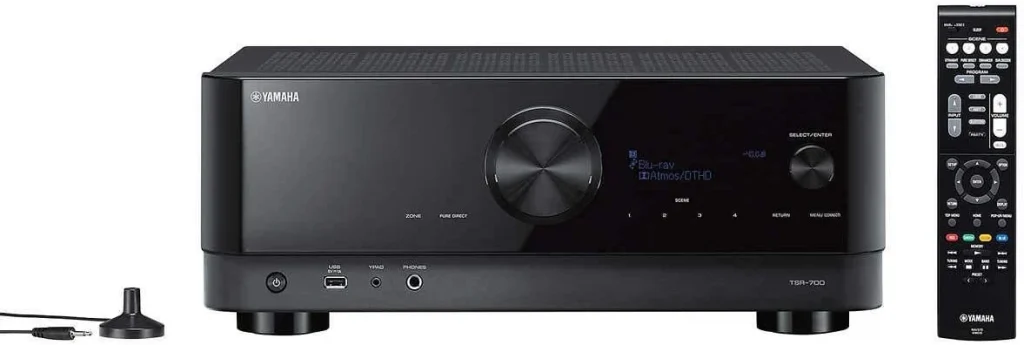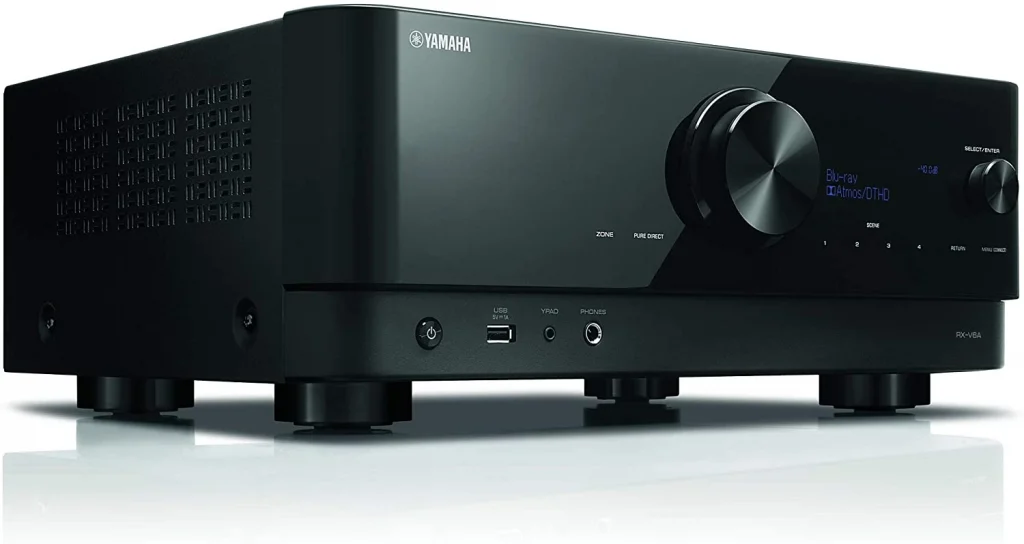Are you looking for a great receiver to upgrade the home theater system and are interested in Yamaha’s products? As we know, receivers and audio devices from the Yamaha brand are famous for their high quality and amazing features.
If you have narrowed your selection to the TSR 700 and RX V6A, read this in-depth Yamaha TSR 700 vs. RX V6A to learn about their core differences. We will discuss the strengths and weaknesses of each product to help you choose the most optimal receiver for your needs and preferences. Continue reading to learn more!
Read also: Klipsch R-52c Vs. R-25c
An Overview Of The Yamaha TSR 700
The Yamaha TSR 700 is a seven-channel receiver with a beautiful design and modern features. It delivers great audio quality, suitable for various tasks such as movie watching or playing games.
This receiver is perfect for the Dolby Atmos with the advanced upward-firing channels. The DTS: X also delivers immersive and realistic audio. Yamaha TSR 700 also supports the latest HDMI connectors.
The HDMI ports allow it to send and receive up to 4K and 8K audio signals with virtually no interruption or sound distortion. Another noticeable feature is voice control, which gives you so much comfort in the usage process.

An Overview Of The RX V6A Receiver
The RX V6A is a high-end receiver with a clean and spacious design. It can provide excellent audio quality with authentic and immersive sounds. This receiver supports a wireless connection (wifi connection and Bluetooth), allowing you to pair it with various speakers from a far distance.
With the Parametric Room Acoustic Optimizer (YPAO) technology, you can put the receiver in any home audio system or room with a different interior structure and still get the best audio quality. Similar to the TSR 700, this device also supports the HDMI connection to send or receive 4K and 8K video signals.

Yamaha TSR 700 Vs. RX V6A Side By Side Comparison
| Features | TSR 700 | RX V6A |
| Number of channels | seven channels | seven channels |
| Output per channel | 100 Watts (8 ohms, 0.06% THD) | 100 Watts (8 ohms, 0.06% THD) |
| Dolby / DTS | Supported | Supported |
| Connector | HDMI 4K120AB, 8K60B, 4K60 and 24GBPS | HDMI 4K120AB, 8K60B, 4K60 and 24GBPS |
| Video compatibility | 4K / 8K pass-through | 4K / 8K pass-through |
| DSP Program | 17 | 17 |
| Supported formats | Dolby Atmos | Dolby Atmos |
| Room calibration | YPAO | YPAO |
| DA converter | 384 kHz / 32-bit | 384 kHz / 32-bit |
Through the comparison table, you can see that the two receivers possess similar hardware and supported features. They also have a similar design with the same size and two large knobs.
Both receivers support HDMI and wireless connections such as Bluetooth and Wifi. So there aren’t any noticeable differences between the Yamaha TSR 700 and RX V6A. They can be controlled via voice command or by using the remote.
If you want a more detailed comparison, consider watching the video below.
Pros And Cons Of The Yamaha TSR 700 vs. RX V6A
Although the two receivers give nearly similar audio quality and performance, each device is more suitable for a specific need. Here are some strengths and weaknesses of each product to consider
Yamaha TSR 700
- Highly customizable with flexible settings
- Simple and convenient control
- Ideal for movie dialogs and music lyrics
- Wireless connection
- Suitable for gaming
- Higher price
- The voice command is hard to set up
Yamaha RX V6A
- Suitable for various rooms and purposes
- Support Bluetooth and Wifi connection
- The advanced YPAO technology
- Efficient HDMI connection
- Flawless audio quality
- Affordability
- Plastic panel
- Need an extra amplifier to use with powerful speakers
Read more:
Final Verdict
There aren’t so many differences between the two receivers in terms of audio quality and performance. Both products offer excellent and authentic sounds with the same seven channels and power output.
However, the TSR 700 has some advanced features that give it a little edge regarding compatibility and performance. Meanwhile, the RX V6A offers great value for its affordable price. So choose the device with a design that matches the room’s interior and is more suitable for your needs. Thank you for reading!






